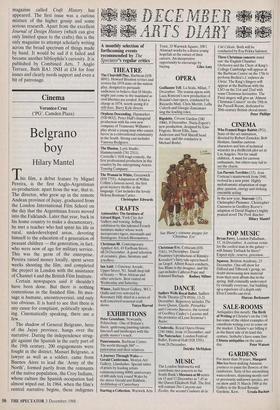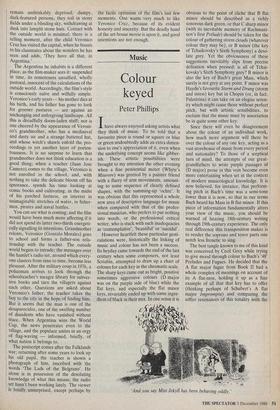Cinema
Veronico Cruz (PG', Camden Plaza)
Belgrano boy
Hilary Mantel
This film, a debut feature by Miguel Pereira, is the first Anglo-Argentinian co-production: apart from the war, that is. The director, who grew up in the remote Andean province of Jujuy, graduated from the London International Film School on the day that the Argentinian forces moved into the Falklands. Later that year, back in his home country to make a documentary, he met a teacher who had spent his life in rural, underdeveloped areas, devoting himself to the education of a generation of peasant children — the generation, in fact, who were now of age for military service. This was the germ of the enterprise. Pereira raised money locally, spent seven weeks shooting the film, and completed the project in London with the assistance of Channel 4 and the British Film Institute.
Certain newspapers said it shouldn't have been done. But there is nothing contentious in the finished film. Its mes- sage is humane, uncontroversial, and only too obvious. It is hard to see that there is any cause for complaint, politically speak- ing. Cinematically speaking, there are a few.
The shadow of General Belgrano, hero of the Jujuy province, hangs over the narrative. During the independence strug- gle against the Spanish in the early part of the 19th century, 200 engagements were fought in the district; Manuel Belgrano, a lawyer as well as a soldier, came from Buenos Aires to lead the 'Army of the North', formed partly from the remnants of the native population, the Croy Indians, whose culture the Spanish occupation had almost wiped out. In 1964, when the film's central narrative begins, these indigenes remain unthinkably deprived; dumpy, dark-featured persons, they toil in stony fields under a blinding sky, withdrawing at dusk into lamplit stone huts. Contact with the outside world is minimal; there is a telling moment, after the child Veronico Cruz has visited the capital, when he boasts to his classmates about the wonders he has seen and adds, 'They have all that, in Argentina.'
The Argentina he inhabits is a different place, as the film-maker sees it: suspended in time, its remoteness unsullied, wholly pastoral, innocent of the calculations of the outside world. Accordingly, the film's style is consciously naïve and wilfully simple. Veronico's early years — his mother dies at his birth, and his father has gone to look for greener pastures — are against an unchanging and unforgiving landscape. All this is dreadfully doom-laden stuff; nor is one cheered by the appearance of Veroni- co's grandmother, who has a mediaeval and dusty air and a strange battered hat, and whose witch's shawls enfold the pro- ceedings in yet another layer of porten- tousness. It is no surprise to learn that grandmother does not think education is a good thing; when a teacher (Juan Jose Camero) comes to the village, Veronico is not enrolled in the school, and, with nothing to take the delicate bloom off his ignorance, spends his time looking at comic books and cultivating, in the midst of his parched fastness, an interest in unimaginable stretches of water, in fisher- men, pirates and naval battles.
You can see what is coming; and the film would have been much more affecting if it did not spend its latter two-thirds energeti- cally signalling its intentions. Grandmother relents, Veronico (Gonzalo Morales) goes to school and forms a father-son rela- tionship with the teacher. The outside world begins to intrude; the messages over the hamlet's radio set, around which every- one clusters from time to time, become less pleasant. After the military coup in 1976, a policeman arrives to look through the schoolteacher's meagre library for subver- sive books and turn the villagers against each other. Questions are asked about Veronico's father; the teacher takes the boy to the city in the hope of finding him. But it seems that the man is one of the desaparecidos, one of the swelling number of dissidents who have vanished without trace. When Argentina wins the World Cup, the news penetrates even to the village, and the populace unites in an orgy of flag-waving — informed, briefly, of what nation it belongs to.
The postscript comes after the Falklands war; returning after some years to look up his old pupil, the teacher is shown a photograph of him, inscribed with the words 'The Lads of the Belgrano'. He alone is in possession of the desolating knowledge of what this means; the radio set hasn't been working lately. The viewer is totally unsurprised, except perhaps by
the facile optimism of the film's last few moments. One wants very much to like Veronico Cruz, because of its evident honesty and sincerity. But the deadly hand of the art-house movie is upon it, and good intentions are not enough.



































































 Previous page
Previous page